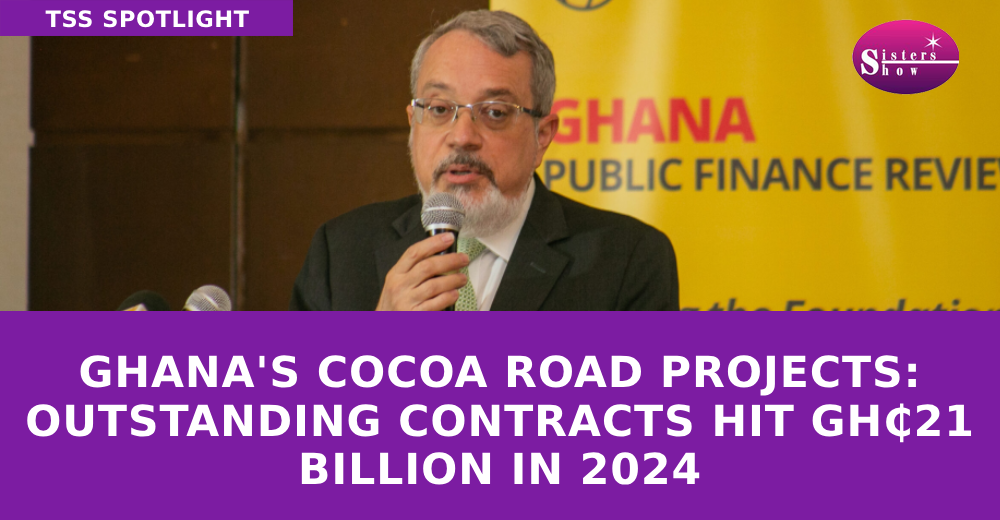
GHANA’S COCOA ROAD PROJECTS: OUTSTANDING CONTRACTS HIT GH₵21 BILLION IN 2024
Ghana has made significant investments in improving road infrastructure, particularly in cocoa-producing regions. In 2014, the government initiated a $450 million Cocoa Roads Rehabilitation Project to enhance transportation and accessibility in key agricultural areas. Over the years, the initiative has expanded, but outstanding contracts for cocoa road projects have now reached GH₵21 billion ($1.3 billion) in 2024.
Background: Cocoa Road Rehabilitation Project
The Cocoa Roads Rehabilitation Project, funded through the Ghana Cocoa Board (COCOBOD), aimed to upgrade roads in the Ashanti, Western, Eastern, and Brong-Ahafo regions. Announced by President John Mahama, the project was structured to receive $150 million annually over three years, ensuring the continuous development of road networks essential for cocoa transportation.
Progress and Expansion of Road Infrastructure
In 2021, the Minister for Roads and Highways, Kwasi Amoako-Atta, revealed that the government had earmarked 11,000km of roads for construction nationwide, with 6,000km expected to be completed by 2024. Among these, the Cocoa Roads Programme covered 325 road networks spanning 5,000km at an estimated cost of GH₵14.5 billion.
Current Status: Outstanding Contracts and Fiscal Impact
As of the end of 2024, the outstanding contracts for cocoa road projects have accumulated to GH₵21 billion, raising concerns about funding and economic management. At the Ghana Public Finance Review by the World Bank on February 12, 2025, experts highlighted fiscal discipline as a key challenge affecting Ghana’s economic stability.
Insights from Economic Experts
David Elmaleh, a Senior Economist at the World Bank, acknowledged Ghana’s robust agricultural growth despite global economic uncertainties. However, he emphasized the need for modern agricultural infrastructure and services to sustain long-term development.
Key Economic Insights:
- Public spending in agriculture primarily supports subsidies, consuming 51% of the Ministry of Food and Agriculture’s budget, leaving only 26% for capital investment.
- COCOBOD has faced financial constraints, leading to large annual losses and increased fiscal risks due to expenditures on cocoa roads, fertilizers, and pesticides.
- Fiscal policies are undergoing transformation with the introduction of Planting for Food and Jobs 2.0, shifting towards a smart agricultural input credit system.
Fiscal Challenges and Revenue Management
Ghana’s tax revenue collection has declined in recent years, reducing from 15.7% of GDP in 2017 to 13% in 2021. Factors contributing to revenue loss include:
- Exemptions on VAT, personal income tax, and import duties, leading to a 3.9% GDP revenue loss.
- Complexity in the tax system, affecting compliance and efficiency.
- Weak expenditure controls, resulting in increased debt accumulation and limited fiscal space.
Ghana’s Debt Management and Future Outlook
Robert Taliercio, Country Director for Ghana, Sierra Leone, and Liberia at the World Bank, highlighted Ghana’s economic progress from 2009 to 2019, with an average GDP growth of 6.8% and a significant reduction in poverty levels. However, the 2022 economic crisis, driven by high debt levels (93% of GDP), impacted economic stability.
Strategies for Sustainable Growth:
- Strengthening fiscal discipline to improve expenditure management.
- Increasing domestic revenue collection to reduce reliance on external debt.
- Continuing economic reforms to maintain Ghana’s positive macroeconomic outlook.
Conclusion
Ghana’s Cocoa Roads Rehabilitation Project has played a vital role in improving infrastructure in key agricultural regions. However, the GH₵21 billion in outstanding contracts highlights the need for better fiscal planning and revenue mobilization. With ongoing economic reforms and disciplined expenditure management, Ghana can achieve sustainable growth while enhancing its road infrastructure to benefit the cocoa industry and beyond.




